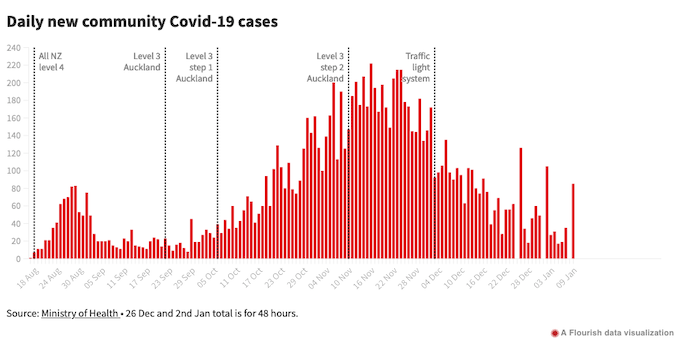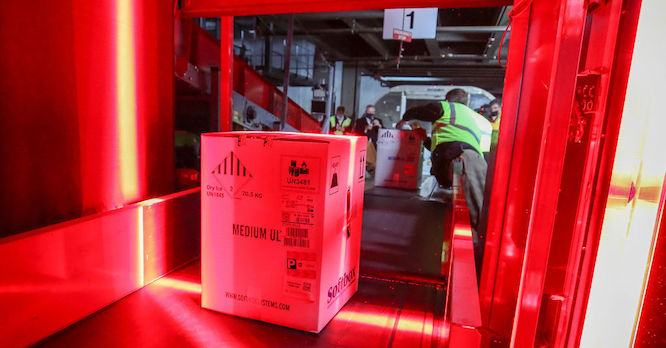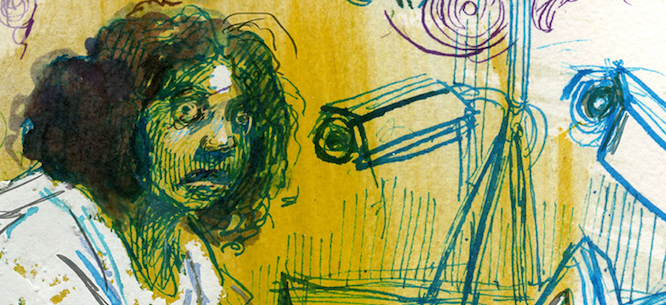New Zealanders in Australia will be able to return home by the end of the month under a five-stage reopening plan announced by the government today.
The first stages of the plan would see returning vaccinated New Zealanders able to go into self-isolation and taking a test on arrival, rather than going into managed isolation and quarantine (MIQ).
Prime Minister Jacinda Ardern revealed the plan in a speech to Business New Zealand this morning, in which she defended the government’s use of MIQ and pledged there would be “life after covid”.
“It’s easy to hear the word MIQ and immediately associate it with heartache. There is no question that for New Zealand it has been one of the hardest parts of the pandemic,” she said.
“But the choice to use it undeniably saved lives … MIQ meant not everyone could come home when they wanted to but it also meant that covid could not come in when it wanted to, either.”
The five stages:
- 11.59pm 27 February: Self-isolation opens for New Zealanders and eligible travellers coming from Australia
- 11.59pm 13 March: Open to New Zealanders and eligible travellers from the rest of the world; skilled workers earning at least 1.5x median wage; working holiday visas
- 11.59pm 12 April: Offshore temporary visa holders who still meet visa requirements; 5000 international students; consideration of further class exemptions for critical workforces that do not meet the 1.5x median wage test
- By July: Anyone from Australia; visa-waiver travel; a new Accredited Employer Work Visa opens and skilled worker exemption is phased out
- In October: Border reopens to the rest of the world, all visa categories fully reopen
Unvaccinated travellers would still go into MIQ, but with less demand the Defence Force would begin withdrawing and some facilities would return to being hotels. A core quarantine capacity would be maintained and scaled up, to become a National Quarantine Service.
Self-isolation period
The self-isolation period for returning travellers would match that for close contacts under the government’s phased approach to Omicron: 10 days under phase one, seven days under phase two and three.
All arrivals will be given three rapid antigen tests, returning results on day 0/1 and on day 5/6, with one extra test. Positive results will be confirmed with a PCR test.
Ardern said the tools used to help battle the health crisis had not stayed the same, and while some may feel anxious about the reopening plan, the isolation, testing and high vaccination rates would help keep the virus from spreading too quickly.
The shorter three-month interval between second and booster dose announced yesterday would mean more people were boosted by the time the first stage hit.
Ardern said the government would be continually monitoring the value of self-isolation, and it was possible it may not be needed in the “not too distant future”.
She also confirmed she would lead trade delegations this year to Australia, Asia, the United States and Europe.

‘New Zealand is in demand’
“New Zealand is in demand. Our exports are at record highs, people want to live and work here, international students want to study here, our friends and whānau want to return,” she said.
“Covid laid bare our unsustainable reliance on temporary migrant labour. Immigration will continue to be a part of our economic story, but we have the opportunity now to build resilience into our workforces while also attracting the skills and talent we need.
“We have a chance to do things differently.”
“I hear much talk of a return to business as usual but we are better than business as usual … we must now carve our own recovery. On our terms.”
“We are vaccinated, increasingly boosted, and continue to prepare ourselves at home and work with a plan – and so now it is time to move forward together, safely.”
The critical worker border exemptions under Step 1 of the border reopening would cover:
- Critical health workers
- Dairy farm managers and assistants
- Shearers and wool handlers
- Deepwater fishing crew
- Rural contractors
- Veterinarians
- Teachers
- International students
- Major infrastructure projects
- Tech sector workers
- External auditors
- Government-approved events and programmes
- Other short- and long-term ‘critical workers’
147 new community cases – 13 in hospital
The Ministry of Health reported today there were 147 new cases of covid-19 in the community and 44 at the border. Omicron is already the dominant strain.
In a statement, the ministry said the new community cases were in Northland (14), Auckland (90), Waikato (15), Rotorua (8), Taupō (1), Bay of Plenty (8), Hawke’s Bay (7) and Wellington (4).
A person admitted to Wellington Hospital has tested positive for covid-19, Capital and Coast DHB confirmed this morning. The ministry said there were another 12 people in hospital in Auckland, Rotorua and Hawke’s Bay.
There are no people in intensive care.
This article is republished under a community partnership agreement with RNZ.
This post was originally published on Asia Pacific Report.


